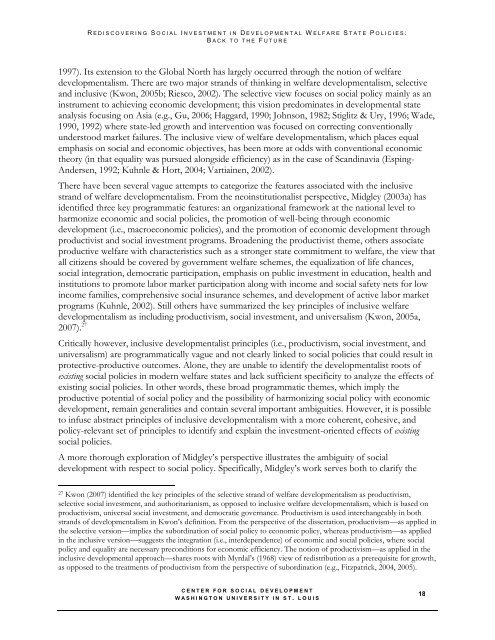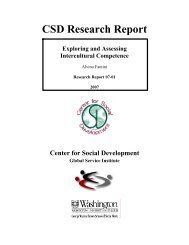Rediscovering social investment in developmental welfare state ...
Rediscovering social investment in developmental welfare state ...
Rediscovering social investment in developmental welfare state ...
Create successful ePaper yourself
Turn your PDF publications into a flip-book with our unique Google optimized e-Paper software.
R E D I S C O V E R I N G S O C I A L I N V E S T M E N T I N D E V E L O P M E N T A L W E L F A R E S T A T E P O L I C I E S :<br />
B A C K T O T H E F U T U R E<br />
1997). Its extension to the Global North has largely occurred through the notion of <strong>welfare</strong><br />
<strong>developmental</strong>ism. There are two major strands of th<strong>in</strong>k<strong>in</strong>g <strong>in</strong> <strong>welfare</strong> <strong>developmental</strong>ism, selective<br />
and <strong>in</strong>clusive (Kwon, 2005b; Riesco, 2002). The selective view focuses on <strong>social</strong> policy ma<strong>in</strong>ly as an<br />
<strong>in</strong>strument to achiev<strong>in</strong>g economic development; this vision predom<strong>in</strong>ates <strong>in</strong> <strong>developmental</strong> <strong>state</strong><br />
analysis focus<strong>in</strong>g on Asia (e.g., Gu, 2006; Haggard, 1990; Johnson, 1982; Stiglitz & Ury, 1996; Wade,<br />
1990, 1992) where <strong>state</strong>-led growth and <strong>in</strong>tervention was focused on correct<strong>in</strong>g conventionally<br />
understood market failures. The <strong>in</strong>clusive view of <strong>welfare</strong> <strong>developmental</strong>ism, which places equal<br />
emphasis on <strong>social</strong> and economic objectives, has been more at odds with conventional economic<br />
theory (<strong>in</strong> that equality was pursued alongside efficiency) as <strong>in</strong> the case of Scand<strong>in</strong>avia (Esp<strong>in</strong>g-<br />
Andersen, 1992; Kuhnle & Hort, 2004; Vartia<strong>in</strong>en, 2002).<br />
There have been several vague attempts to categorize the features associated with the <strong>in</strong>clusive<br />
strand of <strong>welfare</strong> <strong>developmental</strong>ism. From the neo<strong>in</strong>stitutionalist perspective, Midgley (2003a) has<br />
identified three key programmatic features: an organizational framework at the national level to<br />
harmonize economic and <strong>social</strong> policies, the promotion of well-be<strong>in</strong>g through economic<br />
development (i.e., macroeconomic policies), and the promotion of economic development through<br />
productivist and <strong>social</strong> <strong><strong>in</strong>vestment</strong> programs. Broaden<strong>in</strong>g the productivist theme, others associate<br />
productive <strong>welfare</strong> with characteristics such as a stronger <strong>state</strong> commitment to <strong>welfare</strong>, the view that<br />
all citizens should be covered by government <strong>welfare</strong> schemes, the equalization of life chances,<br />
<strong>social</strong> <strong>in</strong>tegration, democratic participation, emphasis on public <strong><strong>in</strong>vestment</strong> <strong>in</strong> education, health and<br />
<strong>in</strong>stitutions to promote labor market participation along with <strong>in</strong>come and <strong>social</strong> safety nets for low<br />
<strong>in</strong>come families, comprehensive <strong>social</strong> <strong>in</strong>surance schemes, and development of active labor market<br />
programs (Kuhnle, 2002). Still others have summarized the key pr<strong>in</strong>ciples of <strong>in</strong>clusive <strong>welfare</strong><br />
<strong>developmental</strong>ism as <strong>in</strong>clud<strong>in</strong>g productivism, <strong>social</strong> <strong><strong>in</strong>vestment</strong>, and universalism (Kwon, 2005a,<br />
2007). 27<br />
Critically however, <strong>in</strong>clusive <strong>developmental</strong>ist pr<strong>in</strong>ciples (i.e., productivism, <strong>social</strong> <strong><strong>in</strong>vestment</strong>, and<br />
universalism) are programmatically vague and not clearly l<strong>in</strong>ked to <strong>social</strong> policies that could result <strong>in</strong><br />
protective-productive outcomes. Alone, they are unable to identify the <strong>developmental</strong>ist roots of<br />
exist<strong>in</strong>g <strong>social</strong> policies <strong>in</strong> modern <strong>welfare</strong> <strong>state</strong>s and lack sufficient specificity to analyze the effects of<br />
exist<strong>in</strong>g <strong>social</strong> policies. In other words, these broad programmatic themes, which imply the<br />
productive potential of <strong>social</strong> policy and the possibility of harmoniz<strong>in</strong>g <strong>social</strong> policy with economic<br />
development, rema<strong>in</strong> generalities and conta<strong>in</strong> several important ambiguities. However, it is possible<br />
to <strong>in</strong>fuse abstract pr<strong>in</strong>ciples of <strong>in</strong>clusive <strong>developmental</strong>ism with a more coherent, cohesive, and<br />
policy-relevant set of pr<strong>in</strong>ciples to identify and expla<strong>in</strong> the <strong><strong>in</strong>vestment</strong>-oriented effects of exist<strong>in</strong>g<br />
<strong>social</strong> policies.<br />
A more thorough exploration of Midgley‘s perspective illustrates the ambiguity of <strong>social</strong><br />
development with respect to <strong>social</strong> policy. Specifically, Midgley‘s work serves both to clarify the<br />
27 Kwon (2007) identified the key pr<strong>in</strong>ciples of the selective strand of <strong>welfare</strong> <strong>developmental</strong>ism as productivism,<br />
selective <strong>social</strong> <strong><strong>in</strong>vestment</strong>, and authoritarianism, as opposed to <strong>in</strong>clusive <strong>welfare</strong> <strong>developmental</strong>ism, which is based on<br />
productivism, universal <strong>social</strong> <strong><strong>in</strong>vestment</strong>, and democratic governance. Productivism is used <strong>in</strong>terchangeably <strong>in</strong> both<br />
strands of <strong>developmental</strong>ism <strong>in</strong> Kwon‘s def<strong>in</strong>ition. From the perspective of the dissertation, productivism—as applied <strong>in</strong><br />
the selective version—implies the subord<strong>in</strong>ation of <strong>social</strong> policy to economic policy, whereas productivism—as applied<br />
<strong>in</strong> the <strong>in</strong>clusive version—suggests the <strong>in</strong>tegration (i.e., <strong>in</strong>terdependence) of economic and <strong>social</strong> policies, where <strong>social</strong><br />
policy and equality are necessary preconditions for economic efficiency. The notion of productivism—as applied <strong>in</strong> the<br />
<strong>in</strong>clusive <strong>developmental</strong> approach—shares roots with Myrdal‘s (1968) view of redistribution as a prerequisite for growth,<br />
as opposed to the treatments of productivism from the perspective of subord<strong>in</strong>ation (e.g., Fitzpatrick, 2004, 2005).<br />
C E N T E R F O R S O C I A L D E V E L O P M E N T<br />
W A S H I N G T O N U N I V E R S I T Y I N S T . L O U I S<br />
18
















